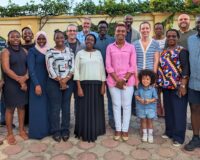TANZANIAN PRESIDENT H.E. JAKAYA M. KIKWETE CALLS FOR UNITED NATIONS SUMMIT ON NON-COMMUNICABLE DISEASES (NCDs) TO INCLUDE ORAL DISEASE
Developmental and Dental Experts Agree that Oral Disease Needs to be Addressed Worldwide: Sponsored by the United Republic of Tanzania, with support from the World Health Organization, and co-sponsored by the Governments of Australia and Sweden
NEW YORK, NEW YORK, September 22, 2011 – Tanzanian President H.E. Jakaya Mrisho Kikwete urged the United Nations Summit on Non-Communicable Diseases (NCDs) to address the challenge of oral health as a priority on the agenda.
“Oral diseases are often overlooked among NCDs by the international community, and it is a health area that we cannot afford to ignore and that is largely preventable,” said the President. “I implore my fellow heads of state and governments to include oral health among the NCDs and for health ministries to become more engaged. We must have a shared sense of moral duty to make proper oral health a priority.”
The President delivered this statement to an audience of 100 dental health experts and leaders, as well as high-level representatives from the diplomatic community, at a symposium entitled “Putting Teeth into NCDs,” held on September 19 at the New York University College of Dentistry.
The program was emceed by Ali Velshi, CNN Anchor and Chief Business Correspondent, and focused on critical issues related to the global burden of oral disease and integrating oral disease into primary health care.
In addition to President Kikwete’s keynote address, the event included remarks by Dr. Ray Williams, Dean of the Stony Brook University School of Dental Medicine, who spoke about the connection between common risk factors of NDCs and oral diseases, highlighting that “dental caries is the most common NCD among children worldwide.” He also emphasized the need to “treat a person’s general state of health as a whole, by including oral health.”
Dr. Habib Benzian, CEO for Fit for School International Inc., co-author of the FDI Oral Health Atlas, and a Senior Advisor to FDI World Dental Federation spoke about the current realities and challenges of oral diseases around the world.”
Helen Clark, Administrator of the United Nations Development Program (UNDP) and the former Prime Minister of New Zealand, spoke about the importance of linking oral diseases to the NCDs and the United Nations Millennium Development Goals and “the need for health and development actors to understand each other and to work together across a wide range of sectors.” She also highlighted that “this is about smart, cost-effective policy choices, regardless of a country’s economic status.”
Access to oral health care—an integral part of a society’s and an individual’s overall health and quality of life—is severely lacking for many around the world, both in developing and high income nations. Under President Kikwete’s leadership, the Government in Tanzania has been a leader in putting oral health care on the agenda of the U.N. General Assembly.
Over the past several years, MCW (Miracle Corners of the World) has been working with the Tanzanian government leaders and health officials to achieve sustainable oral healthcare in the country. Recent efforts include the upgrading of the country’s leading dental school’s laboratory.
Institutions, including the World Health Organization and the American Dental Association (ADA), are increasingly recognizing the link between oral health and overall health, including the link between periodontal disease and diabetes, coronary heart disease, preterm birth and low birth weight. And yet, according to the World Health Organization, 60-90 percent of school children worldwide suffer from dental cavities. Severe periodontal (gum) disease, which may result in tooth loss, is found in 5-20 percent of middle-aged adults.
“President Kikwete has played an important leadership role in recognizing the importance of oral health, its connection to general health, and the benefit of addressing oral health through a common risk factor approach combined with low-tech preventive and therapeutic modalities, particularly fluoridation and early childhood preventive education and screening,” said Dr. Marion Bergman, Director of Health Care Projects for MCW. “The President should be lauded for using his position as a head of state to sensitize his colleagues—other heads of state and their health ministries—to this important issue by sponsoring this side event and delivering the keynote address.”
According to the FDI World Dental Federation, oral diseases and other non-communicable diseases, such as cancer, diabetes, cardiovascular, and respiratory diseases share many common risk factors, including tobacco use, harmful use of alcohol, and poor diet, especially over-consumption of sugar.
“Tanzania has provided a unique opportunity to propel collective action and engage Member States in the process of setting measurable national goals linking oral health to systemic health and well-being,” said Dr. Lois Cohen, Consultant to the National Institute of Dental and Craniofacial Research and advisor to the ‘Putting Teeth into NCDs’ program. “Advancing science-driven interventions that can be implemented at public policy levels, including ensuring optimal fluoride levels in the public’s clean water supplies; reducing sugar, sodium, trans-fats in available food supply and taxing such harmful substances as tobacco and alcohol will benefit population health for many chronic diseases, both in the least developed parts of the world as well as the most industrialized countries.”
The symposium was sponsored by the Government of the United Republic of Tanzania, and cosponsored by the Governments of Australia and Sweden. Support was also provided by American Dental Association (ADA), Colgate-Palmolive, Henry Schein Cares, the global corporate social responsibility program of Henry Schein, Inc.(NASDAQ: HSIC); MCW (Miracle Corners of the World), New York University College of Dentistry, Pan American Health Organization (PAHO), FDI World Dental Federation, and World Health Organization (WHO).
For photos of the event, visit MCW’s gallery on Flickr at http://www.flickr.com/photos/miraclecorners/sets/72157627599242899/show/.
About MCW (Miracle Corners of the World)
MCW (Miracle Corners of the World) is a non-profit organization founded in 1999 with the vision of Local Change through Global Exchange®. Our mission is to empower youth to become positive agents of change in their communities. Based in New York with affiliates in Africa, MCW offers the following programs: Leadership Training, Community Centers and Oral Healthcare Improvement, as well as Partner Initiatives (MCW Jacqueline’s Human Rights Corner and the Container Project). For more information visit www.miraclecorners.org





